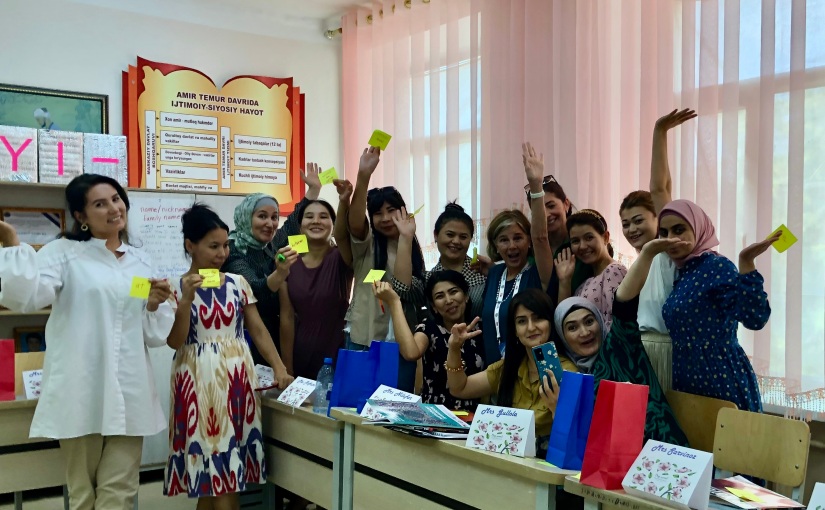I’ve been transported to a different world. In this world I am greeted as a celebrity. With my blondish hair and Irish nose, I am clearly not from around here. People rush to carry my heavy bag and help me get to my destination, even when we have to use Google Translate to communicate. I walk with a fellow blonde American around the lake and kids follow us just to hear what language we’re speaking. Russkiy? they ask. The only foreigners they’ve ever seen are from Russia.
As part of a huge program sponsored by the Uzbek Ministry of Education and the U.S. Embassy (mentioned in this article), 40 American English teachers will work in Uzbekistan training secondary English teachers for four weeks. Our participants are thirsty for knowledge and soak up every lesson like a sponge. I have never felt so appreciated in a classroom. The government has given them huge financial incentive to improve their English proficiency. But it’s more than that.
These teachers are joyful, resourceful, creative, professional, proud, hard-working, risk-taking, respectful, and fun.
Here in Navoiy, a small city that has defied my expectations at every turn, we are three American teachers and a site coach, each with a local counterpart, and almost 50 participants, all secondary teachers. In my class, several women commute an hour each way to get to 16 Maktab, our training site. Two sisters live on a farm far from town. All have household chores when they get home and cater to their mothers-in-law, with whom they live. It’s 104 degrees outside and the AC at full blast barely cools the room. Despite these obstacles, they show up every morning at 8:30 ready to learn.
Our facilitator’s guidebook was carefully put together by American Councils, full of resources, activities and cultural connections. Since this professional development is really a cultural exchange, it is an honor to learn about Uzbek traditions by the best cultural ambassadors in the country: teachers. On Culture Day, these women put together a two-hour celebration with little notice. They brought textiles, arts & crafts, and delicious local food that they cooked the night before. They dressed in ornate traditional outfits and put on a full show with games, music, dancing, and theatre.
When they finished, the Americans had to present something from our culture. We taught them the Hokey Pokey.
In the classroom, we present active lessons for English instruction: Running Dictation, Bicycle Chain, Mingle Info Gap, Think-Pair-Share. And we teach the language needed for them to deliver instruction completely in English. Then each week, they do a micro-teaching lesson in front of their peers. From Week 1 to Week 2, their confidence increased and they showed amazing growth. One of the things we teach is the vocabulary of encouragement. I am inspired by their eagerness and could not be more proud of this group. Good job!
This weekend, we will take a field trip to a local attraction and students will teach us the significance of this place. This town does not attract a lot of tourists, but after our class puts together a tourist brochure in English, they will certainly be ready!
In the words of Alisher Navoiy, the founder of Navoiy, the greatest blessing is amity. I am sure that our friendship will endure long after the closing ceremony.



